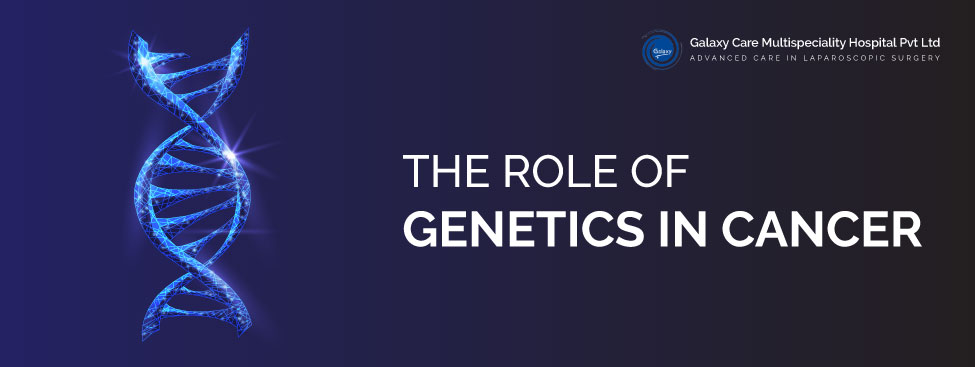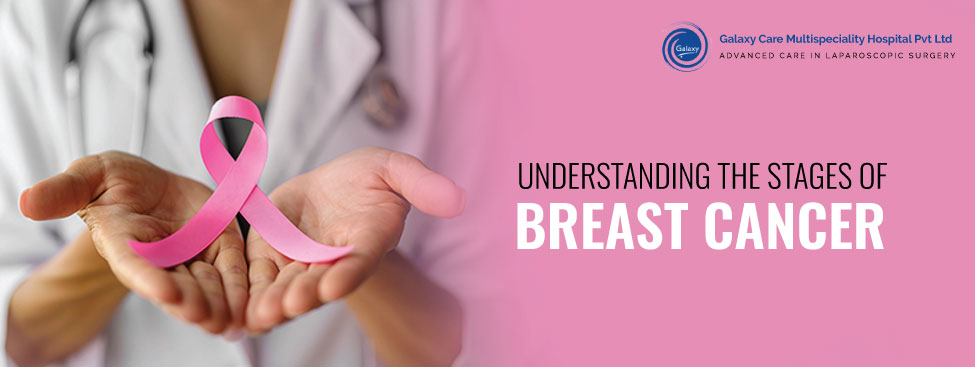
THE ROLE OF GENETICS IN CANCER: WHAT YOU NEED TO KNOW
Cancer is a complex disease that arises from a combination of genetic and environmental factors. Understanding the role of genetics in cancer is crucial for early detection, personalized treatment, and improved patient outcomes. As our knowledge of the genetic underpinnings of cancer continues to grow, individuals need to be informed about the significance of genetics in the development and management of this disease. At Galaxy Care Hospital, the Best Cancer Hospital in Pune, we aim to spread awareness on cancer from the point of symptoms to how it is developed and ways to manage it. Let us help you understand the role of genetics in cancer.
The Basics of Cancer Genetics
Cancer is a complex disease that is fundamentally driven by genetic changes within cells. At the core of cancer are alterations, or mutations, in the genes that control cell growth, division, and survival. These genetic changes can disrupt the normal mechanisms that regulate cell behaviour, ultimately leading to uncontrolled cell proliferation and the formation of a cancerous tumor.
Two main categories of genetic mutations contribute to cancer: Inherited (germline) Mutations and Acquired (somatic) Mutations.
Inherited Genetic Mutations
Inherited genetic mutations are present in every cell of the body and are passed down from one generation to the next. These mutations can significantly increase an individual’s risk of developing certain types of cancer, such as breast cancer (BRCA1 and BRCA2 mutations), Lynch syndrome, and Li-Fraumeni syndrome.
Acquired Genetic Mutations
In contrast, acquired genetic mutations are not inherited but rather occur during an individual’s lifetime. These somatic mutations can arise due to various factors, including exposure to carcinogens, DNA replication errors, and random chance. Somatic mutations are not present in all cells of the body but are localized to the cancer cells themselves. The accumulation of multiple somatic mutations can drive the transformation of normal cells into cancerous cells, leading to tumour formation and progression.
The Role of Genetics in Cancer Diagnosis and Treatment
Understanding the distinction between inherited and acquired genetic mutations is critical in cancer risk assessment, early detection, and personalized treatment approaches.
Genetic Testing and Risk Assessment
Genetic testing can help identify individuals with inherited genetic mutations that increase their risk of developing certain types of cancer. This information can guide early screening and preventive measures, allowing for earlier detection and potentially better outcomes.
Personalized Cancer Treatment
Genetic profiling of a patient’s tumor can reveal specific genetic alterations that drive cancer’s growth. This information can be used to select targeted therapies that are more effective in treating the individual’s cancer, a concept known as “precision medicine” or “personalized medicine”. This approach has led to significant improvements in cancer treatment outcomes. If you or your loved one is suffering from cancer, consult the Best Oncologist in Pune for a personalised cancer treatment.
The Impact of Genetics on Cancer Prevention and Screening
Genetic information plays a crucial role in cancer prevention and early detection.
Cancer Prevention Strategies
Individuals with inherited genetic mutations that increase their cancer risk may benefit from enhanced screening and prevention strategies. For example, women with BRCA1 or BRCA2 mutations may consider prophylactic (preventive) mastectomy or more frequent breast cancer screening to reduce their risk.
Early Detection and Screening
Genetic testing can also help identify individuals at higher risk of developing certain types of cancer, allowing for earlier and more frequent screening. This can lead to the detection of cancers at earlier, more treatable stages, significantly improving patient outcomes.
Conclusion
The role of genetics in cancer is a crucial and rapidly evolving field of study. By understanding the genetic factors that contribute to the development and progression of cancer, individuals can make informed decisions about their health and seek appropriate cancer screening, prevention, and treatment options.If you or a loved one are facing a cancer diagnosis, it is essential to seek care from the Best Cancer Hospital in Pune with experienced cancer specialists. Galaxy Care Hospital offers comprehensive cancer care, including advanced genetic testing and personalized treatment options. Our team of the Best Cancer Specialists in Pune are dedicated to providing compassionate and evidence-based care to patients, ensuring the best possible outcomes. Feel free to get in touch. Remember, staying informed and proactive about the role of genetics in cancer can significantly improve your chances of early detection, effective treatment, and better overall health outcomes.


